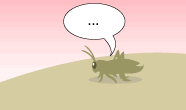In my introductory post, I presented one of many common mistakes made when speaking about evolution. I argued that writing and talking about evolution demands vigilance to avoid finicky issues. In that case, it was inferring a selection pressure for a given trait: Why might longer fingers be better than shorter ones?
Proving that even the MVPs of science can get it wrong when it comes to evolution,

here is a headline from Nature News: "Evolution sparks silence of the crickets: Males on two Hawaiian islands simultaneously went mute in just a few years to avoid parasite."
See the problem? Not yet? How about we compare the headline to this (bad) hypothesis regarding human finger lengths: Humans evolved long fingers to become better piano players.
That’s obviously a very silly hypothesis. Since piano playing came many millennia after fingers, we can definitely rule out tickling the ivories as a factor. But there is another problem here, one that this hypothesis shares with the Nature headline—both suggest that a trait evolved for a specific purpose. Humans evolved fingers to play piano well and crickets evolved mutism to avoid parasites. Sure, it might be comforting to think that organisms can better themselves through evolution, but that just isn’t how evolution works. The idea that traits evolve for a particular reason is a form of teleology, and it can be very difficult to avoid.
A classic example of teleological thinking is saying that birds evolved feathers to fly, suggesting that early birds sat around brooding, “You know what would be cool? Feathers. If we had feathers, we could fly!” This case is also a problem because as in our finger/piano problem, it turns out that feathers long predate flight. The original advantage conferred by feathers was probably insulation and then, once somewhat established, feathers were co-opted for flight.
As an aside, my colleague Glenn Branch has reminded me that the original term for this phenomenon of one trait becoming useful in a new way was preadaptation. Stephen Jay Gould and Elisabeth Vrba pointed out that calling a trait, such as feathers, a pre adapation suggests that it’s a step along the way to its true adaptive purpose (flight, in this example). To counter the teleology, they introduced the term exaptation.
So what should the Nature article have said instead? It seems clear from the paper (and previous accounts of this ongoing research—not to mention this cartoon) that there is strong selection pressure that greatly favors silent crickets on these islands. So, linking mutism and avoiding parasitism seems warranted, but we still need to avoid the teleological “X happened to do Y”. So how about something like, “Males on two Hawaiian islands simultaneously went mute in just a few years enabling them to avoid a parasite”?
A subtle difference, to be sure, but an important one.
See what I mean about being finicky when talking about evolution?
 A fun project for the week: see if you can find similar examples of careless and misleading teleological language about evolution in recent articles by scientists or science communicators. Report back in the comments!
A fun project for the week: see if you can find similar examples of careless and misleading teleological language about evolution in recent articles by scientists or science communicators. Report back in the comments!
p.s. Check out the marvelous Understanding Evolution site. If you don’t already have it bookmarked, do it now.
Images and content courtesy of the University of California Museum of Paleontology, Understanding Evolution. www.understandingevolution.org

